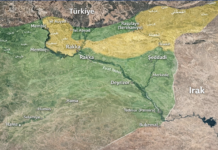Berat Özipek
The Turkish original of this article was published as Halk siyasete format attı first in Yeni Yüzyıl, and then in Serbestiyet on 5th October 2015.
No need to keep accusing the public opinion surveys and companies.
The political atmosphere had turned so heavily against the party in power, that — just as at the very beginning — one out of every two people had fallen silent.
But society did not comprise only the media, the social media, academia, and the business world.
The further down you went, the less influential the dominant ideas became, until finally at the base of the social pyramid the opposite came to prevail.
Over five months, the silent majority carefully followed and observed everything; it measured and weighed all other alternatives — while the twitter nation remained oblivious to what was happening. Under democracy, the people have the final say. So it was; the people spoke, and all other calculations collapsed.
If the electorate first shows a yellow card to a certain party, and then, five months later, restores it primacy, there should be things in this for the others to ponder and try to explain. But once more, this is not what has happened.
How did each party do?
The AKP must have seen that all the votes it has been getting over the years cannot possibly be taken for granted. Thus on the one hand, it seems to have learned from its mistakes before 7th June so as to review its attitude and discourse. On the other hand, people appear to have started worrying about a new “interregnum” leading to strife and discord. Both factors have caused the votes that were previously withheld from the AKP to return. But the AKP should not forget that these votes are not its permanent, inalienable property.
The CHP for its part must have seen that whether it opts for left-nationalism or adopts a more democratic stance does not seem to make any difference; it keeps growing neither taller or shorter. But I am not sure whether it will be able to benefit from this observation. They conducted the best campaign, though to no avail. Unless and until it faces up to its past and heritage of Kemalist ideology, the present “Oriental slyness” of using vague euphemisms in an attempt to appease everybody is not going to get anywhere.
The MHP’s problem was not one of refusing to buy into that strange illusory coalition with the CHP and the HDP which some loci tried to impose on it. On that single point, it might even have scored positively. It was all the “nays” that followed. On the way to the elections, growing anxieties about domestic instability and foreign threats caused a large number of MHP voters to shift to the AKP. There was precious little Mr Bahçeli could do about it.
As for the HDP, it simply wasted the millions of votes that it had received so that it could achieve a stronger representation as a partner to a peaceful solution. As the PKK kept carrying the war to towns and cities by proclaiming self-government, digging trenches and laying booby traps, the HDP imagined that it might be able to manage by mouthing “the Palace’s war” sorts of absurdities. While the Turkish oligarchy kept egging it on through the media and the left, ultimately Demirtaş’s impromptu retorts grew stale, all the rhetoric could not cover up the fundamental problem, and the HDP turned into an ineffectual agent for peace.
Is it really the people who don’t understand?
Instead of trying to understand things, of course there is also the option of trying to explain politics by reference to “popular stupidity”; it helps to calm you down, to postpone responsibility, and to relieve the pain of self-reckoning. But precisely for those reasons, it also represents a chronic incomprehension of politics.
I am not one of those who believe that the people never make any mistakes. But when I look at Turkish politics, what I see is that compared with the educated elites, those broad groups or sections of society that are commonly described as “the people” have long been far more reasonable, and individuals within that category have been acting in a far more flexible and rational way.
They are the ones who keep changing their voting patterns according to the rights and wrongs of the various political actors, either helping them to or relieving them of power. Please let us not waste any breath on those who resort to theories of “free macaroni distribution,” or to mask their own ineptitude by abusing the people. One day history will come to an end and they still will not have understood anything.












